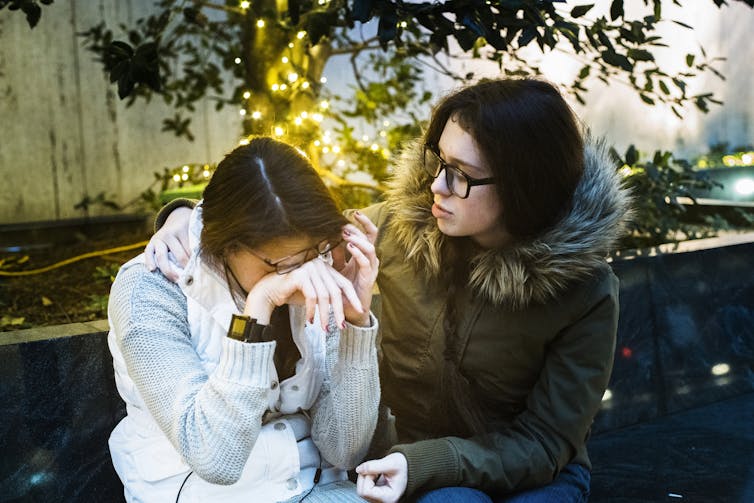
The holiday season, often considered a time of joy and togetherness, can also be one of the most challenging periods for those who are grieving a loss.
Nearly 95% of people who have experienced loss report dealing with at least one symptom of physical or mental distress. Approximately 10% of them develop prolonged grief disorder, a persistent and debilitating form of grief that does not ease with time.
Often, this grief is due to the death of a loved one, but it may also be caused by the loss of a friendship, a divorce or even a job loss.
Grief affects not only mental health but also physical well-being, and it can increase the risk of heart disease, immune dysfunction and even death.
Holidays and special occasions, which often include family gatherings, traditions and reminders of what’s missing, can amplify this pain, leaving those grieving feeling isolated and overwhelmed.
As a clinical psychologist and professor of psychiatry and neurobehavioral sciences working with cancer patients and their families, I see the profound toll grief takes on people. I’ve also experienced grief personally, both when my mother died suddenly at the age of 66 and when my father passed after a long illness at the age of 84.
Those experiences, combined with my research, have driven me to dedicate much of my career to understanding grief and its effects, and to finding effective ways to support those who are struggling with it.
Table of Contents
Mourning vs. prolonged grief
Grief is a natural response to loss, encompassing emotional, cognitive, physical and social reactions. Common signs include sadness, withdrawal, difficulty concentrating, disrupted sleep and physical symptoms like fatigue or aches.
Grief is deeply personal, and while there is no “right” way to grieve, most people move through the process over time, finding a new equilibrium in their lives.
However, some people experience prolonged grief disorder, a condition newly recognized in psychiatry’s gold-standard manual, the Diagnostic and Statistical Manual of Mental Disorders, Fifth Edition, in 2022.
This condition is characterized by intense yearning, sorrow or preoccupation with the deceased that persists for 12 months or more, significantly impairing daily functioning. People experiencing this disorder often feel disconnected from life and unable to find joy or meaning.
Unlike nonpathological grief, prolonged grief disorder is associated with chronic activation of the brain’s stress response system, particularly in areas like the amygdala. The amygdala is a small, almond-shaped cluster of neurons in the brain that plays a key role in processing emotions, especially fear, stress and threat-related responses. Prolonged grief disorder is also linked to mental health conditions such as depression, anxiety and post-traumatic stress disorder, or PTSD.
As you support a friend or family member in their grief, it’s important to watch for signs of prolonged grief disorder because it requires targeted interventions. Research, including my ongoing studies on the use of psilocybin-assisted therapy for the treatment of grief, highlights the importance of innovative approaches to help those stuck in the cycle of prolonged grief.
If you suspect someone you love is struggling with prolonged grief, encouraging them to seek help and offering to support them in the process can be life-changing. Resources are available, from grief counseling to support groups. Organizations like the American Grief Foundation and local mental health services can provide further guidance for helping a loved one get the treatment they require.
Caring for our own grief on holidays and special occasions
Research supports several strategies for addressing grief, whether typical or prolonged:
-
Express emotions: Suppressing grief can exacerbate mental and physical health issues. Talking with trusted friends, journaling and joining support groups can be therapeutic.
-
Engage in rituals: Personal or cultural rituals, like lighting a candle, visiting a grave site or creating a memory book help integrate loss into one’s life.
-
Create new traditions as a way to honor your loss: If you’re mourning a death, consider integrating your loved one’s memory into the occasion by preparing their favorite dish, playing their favorite music or hanging an ornament in their honor.
-
Seek professional support: Cognitive behavioral therapy or complicated grief therapy can be effective treatments for prolonged grief disorder. Psychedelic-assisted therapy is also emerging as a promising option in clinical research.

Alex Potemkin/E+ via Getty Images
Supporting someone as they grieve
For those grieving, holidays and special occasions like a birthday or Mother’s Day can be especially difficult. Here are some practical tips for supporting someone who is grieving during these times:
-
Remember that grief is not a problem to be solved, but a process to be supported.
-
Be present. A common fear is saying the wrong thing to someone who is grieving. Often, it’s not about saying the “perfect” thing, but simply showing up and listening without judgment.
-
Acknowledge the loss. Saying “I’ve been thinking about (their loved one) and how much they meant to you” or “I want you to know that I’ve been thinking about you and the significance of what you’re experiencing right now” can be more comforting than avoiding the subject.
-
Offer practical help. Grief can be debilitating and exhausting. Assisting with tasks like cooking, shopping or child care can relieve some of the burden.
-
If you don’t know what to say, it’s OK to admit it. A simple “I don’t have the right words, but I’m here for you” can mean a great deal.
-
Avoid phrases like “They’re in a better place” or “Everything happens for a reason.” While the intentions behind them are often good, these platitudes can feel dismissive.
-
Focus on empathy and validation. Saying “This must be so hard for you” or “Tell me more about what you’re feeling” opens the door to meaningful conversation and helps make space for the complex emotions that grief brings.
-
Respect the boundaries of your loved one who’s grieving. Let them honor their emotions by going at their own pace.
Navigating holidays and special occasions with those who have experienced a loss can be complicated. But your presence and compassion in these moments can support their healing.
![]()
J. Kim Penberthy does not work for, consult, own shares in or receive funding from any company or organization that would benefit from this article, and has disclosed no relevant affiliations beyond their academic appointment.























